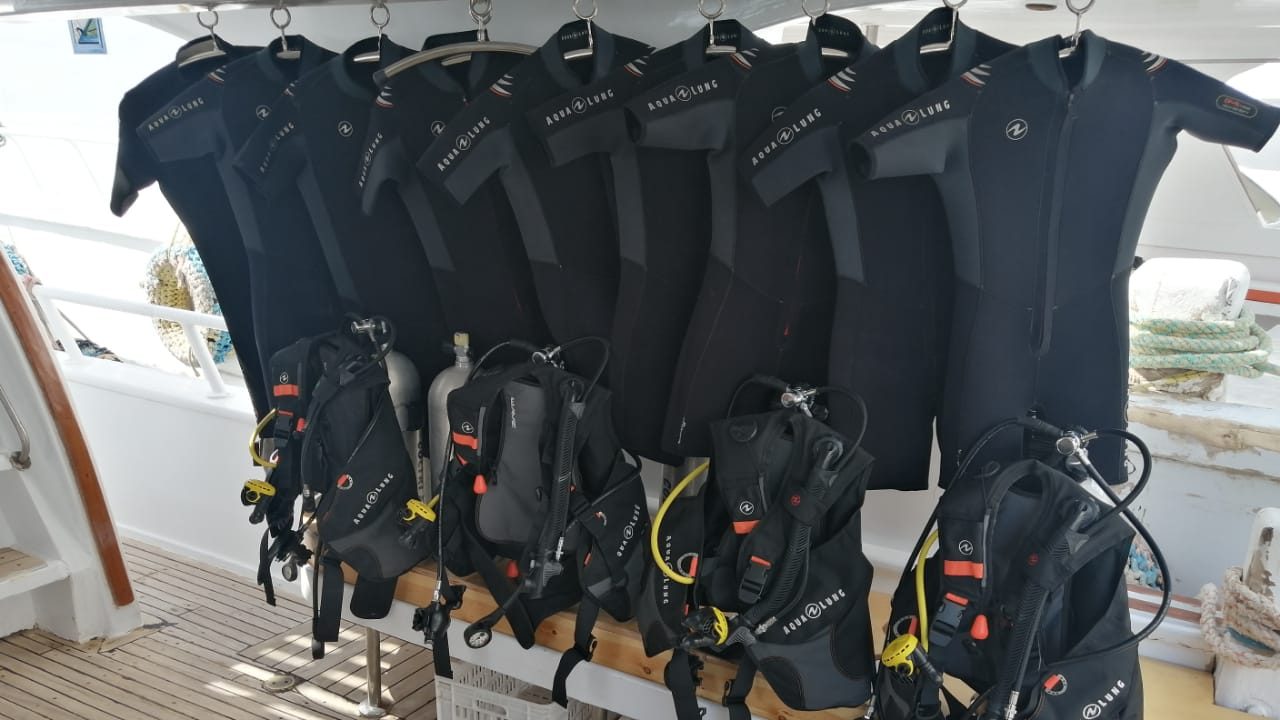Hurghada, a gem on the Red Sea coast, beckons as a haven for scuba diving enthusiasts, offering clear waters, bustling marine life, and a plethora of diving sites tailored for every level of diver. This makes it an ideal spot for aspiring divers to embark on their journey, with the PADI certification as a coveted milestone to dive safely and responsibly.
In embarking on this adventure, beginners will navigate through choosing the right diving course, gearing up for the certification, and knowing what to expect during the course itself, laying down a roadmap for an enriching diving journey that extends beyond the PADI certification to further hone their diving prowess in the mesmerizing waters of Hurghada.
Choosing the Right Diving Course
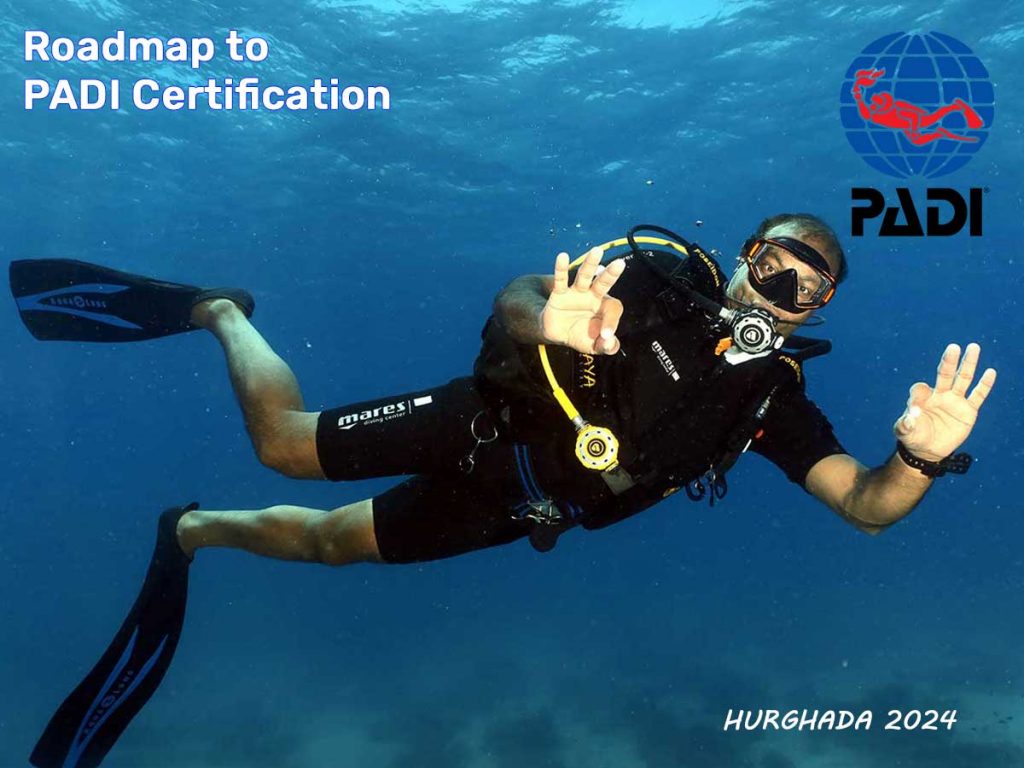
Understanding Course Options
- Explore PADI’s Variety: PADI offers a range of courses suitable for beginners, including the Discover Scuba Diving Experience, Scuba Diver Course, and the comprehensive Open Water Diver Course. Each course is designed to cater to different schedules, depths, and learning preferences.
- Course Details:
- Discover Scuba Diving Experience: Ideal for those curious about scuba diving. It includes a half-day session with a maximum depth of 12 meters.
- Scuba Diver Course: A 2-day course allowing you to dive up to 12 meters.
- Open Water Diver Course: Extending over 3 days, this course enables you to dive up to 18 meters.
Selecting a Dive Center
- Reputation and Safety: Choose a diving center like Diving Around or hurghada Diving Center, known for their safety standards and positive reviews.
- Instructor Quality: Ensure that instructors are well-qualified and that the student-to-instructor ratio is low to receive personalized attention.
- Training Locations: Check whether the center offers pool training or uses sheltered sea-pools, which are ideal for beginners.
Course Logistics
- Flexibility: PADI provides options to learn near your home, on vacation, or a combination of both. This flexibility can help accommodate your schedule and location preference.
- Pricing and Offers: Courses typically include equipment, insurance, and local transportation. Look for centers offering discounts like 10% off for online bookings.
Language and Accessibility
- Language Options: Ensure that the course materials are available in your preferred language. PADI offers resources in multiple languages, enhancing accessibility for non-English speakers.
By carefully considering these aspects, you can choose the right course and diving center, setting the stage for a successful and enjoyable diving in Hurghada.
Preparation for Diving Certification
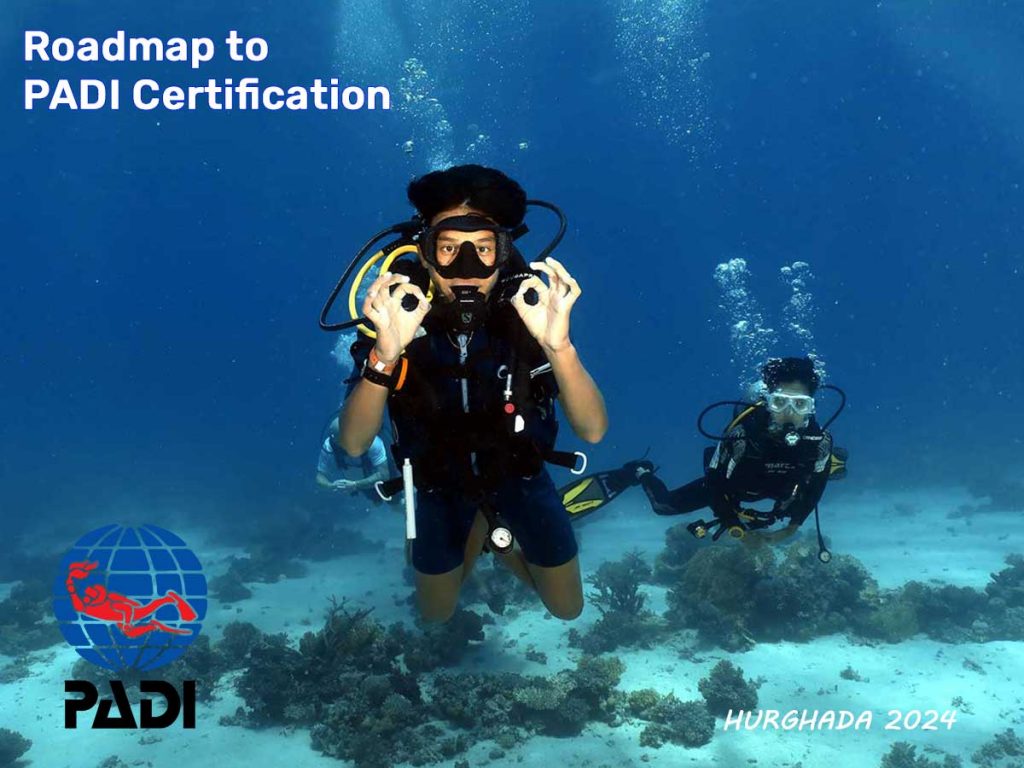
Essential Preparations
- Time and Temperature Considerations: Before heading to Hurghada, check the seasonal water temperatures and choose a period that suits your comfort level.
- Physical Fitness: Ensure you are physically ready for diving by staying hydrated, eating healthily, and getting enough rest. Regular swimming and basic exercises can enhance your stamina and comfort in the water.
Equipment and Logistics
- Personal Equipment: Initially, you’ll need to provide your own basic gear, including a mask, snorkel, and fins. Dive centers in Hurghada typically supply the rest, such as wetsuits and SCUBA units.
- Gear Checks: Always inspect your equipment, especially if it’s rented. Check for any signs of wear or damage on the BCD, regulator, and tank.
Health and Safety
- Medical Clearance: Complete the Diver Medical Form, which might require approval from a physician to ensure you are fit to dive.
- Dive Planning: Adhere to the diving plan provided by your instructor, which includes depth, time, and buddy checks. Always plan your dive and dive the plan.
Course Dynamics
- Classroom and Practical Sessions: Complete any required classroom studies before practical sessions. Be punctual for all classes and dives to maintain a smooth schedule and reduce stress.
- Responsible Practices: Follow all rules on the dive boat and during training, including environmental considerations like using reef-safe sunblock.
By meticulously preparing and adhering to these guidelines, you’ll set yourself up for a successful and enjoyable certification experience in the stunning waters of Hurghada.
What to Expect During Your Diving Course
Knowledge Development
- Online or Offline Learning: Engage with PADI’s comprehensive eLearning materials, which cover essential scuba diving principles, including dive planning and underwater communication.
- Interactive Content: Expect to encounter a mix of educational videos, quizzes, and reading materials that ensure you understand diving terminology and safety protocols.
Confined Water Dives
- Skill Practice: In a controlled pool-like environment, you will learn how to set up your gear, breathe underwater, and perform basic safety checks.
- Instructor Interaction: This phase allows for direct feedback from instructors, ensuring that you grasp each skill thoroughly before advancing.
Open Water Dives
- Real-World Application: Apply the skills you learned in confined water to the open sea, diving up to 18 meters deep.
- Marine Life Encounters: Experience the vibrant underwater ecosystem of Hurghada, potentially spotting turtles, rays, and a variety of fish.
Certification and Beyond
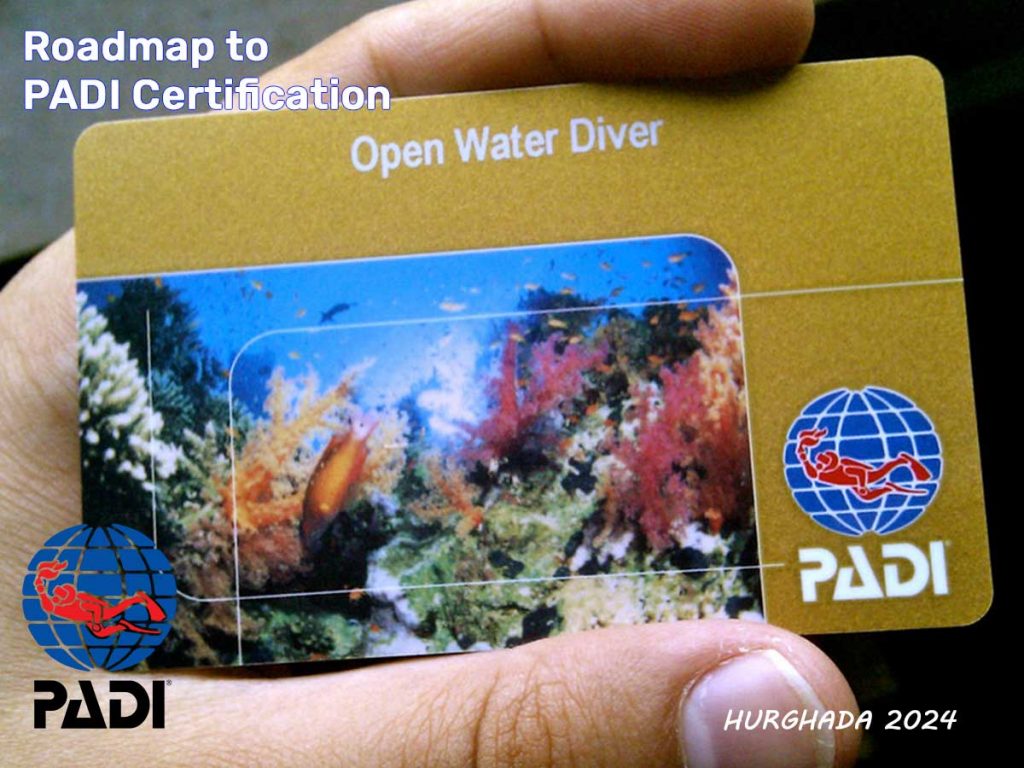
- Lifetime Certification: Upon completion, receive your PADI Open Water Diver certification, which does not expire and is recognized worldwide.
- Further Opportunities: Explore advanced courses and specializations to continue your diving education and experience.
By understanding these phases and what each entails, you will be well-prepared for a successful and enjoyable learning experience in the beautiful waters of Hurghada.
Beyond Certification: Advancing Your Diving Skills
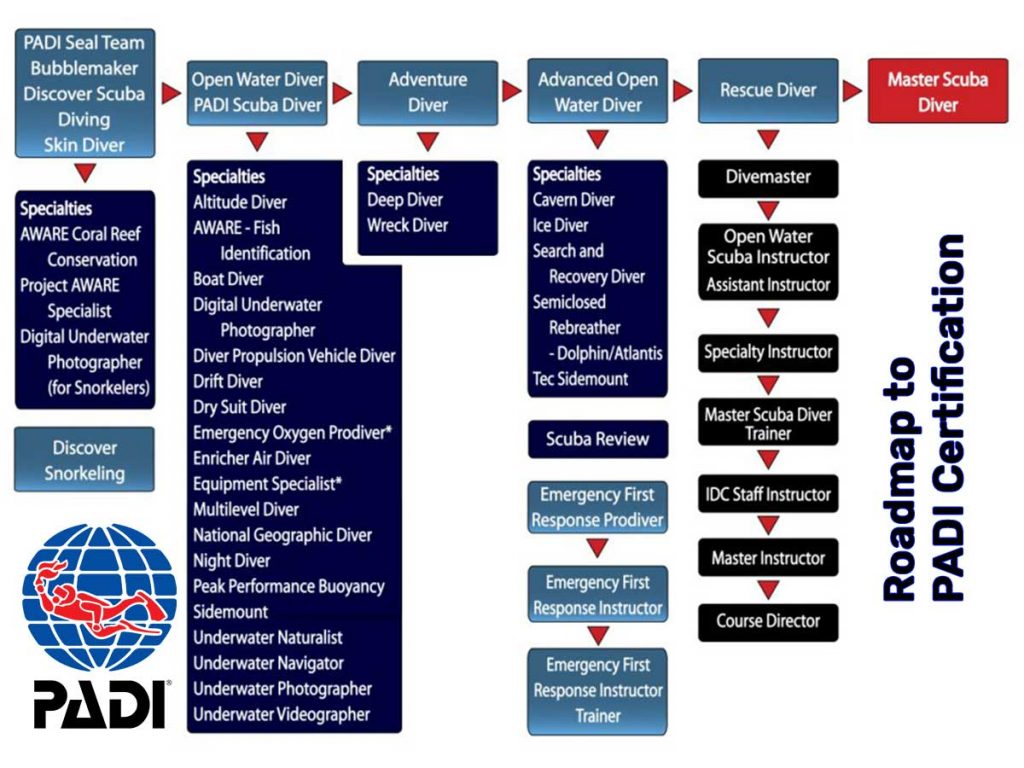
Continuing Education and Skill Enhancement
- Refresher Courses: Engage in the PADI ReActivate Scuba Refresher Program to brush up on your skills, especially if it’s been a while since your last dive. This program combines eLearning with practical sessions under the guidance of a certified instructor.
- Specialty Courses: Broaden your diving capabilities by enrolling in specialty courses such as Peak Performance Buoyancy or Underwater Photography. These courses are designed to refine specific skills and increase your comfort and safety underwater.
- Advanced Certifications: Consider pursuing the Advanced Open Water Diver course, which introduces deeper and more challenging dives while enhancing your underwater navigation skills.
- Join a Dive Club: Connect with local dive clubs to gain more diving experience, learn from seasoned divers, and participate in group dives, which can provide both confidence and safety in unfamiliar waters.
- Master Local Diving: Book a Discover Local Diving experience with a PADI Professional to not only build confidence but also acquire local diving knowledge that can be crucial in different environments.
- Health and Safety Education: Read resources like DAN’s Smart Guide to Ear Equalizing to better understand and manage the physical aspects of diving, ensuring a safer and more enjoyable experience.
- Travel and Exploration: Increase your diving exposure by traveling to renowned sites or exploring local hidden gems with a guide or in a group. Each location offers unique biodiversity and challenges that can enhance your diving proficiency.
- Conservation Efforts: Participate in conservation-focused courses and activities that educate on marine ecosystem preservation, aligning with safe and responsible diving practices.
By embracing these opportunities, you continue to grow as a diver, enhancing both your skills and your enjoyment of the underwater world. Each dive is a step forward in your lifelong diving journey, offering endless possibilities for discovery and adventure.
FAQs
The PADI Open Water Course typically requires three to four days to complete, although this can vary based on your prior experience and the dive school you select. Completion of this course certifies you as a qualified scuba diver.
Yes, Hurghada is an excellent spot for diving, offering daily dive trips and serving as a popular starting point for liveaboard excursions that visit a variety of dive sites to the north or south.
The PADI Open Water Diver certification is the initial level for scuba diving enthusiasts. Once you have this certification, you are allowed to dive up to depths of 18 meters (60 feet) both domestically and internationally. After achieving this level, you can continue your education to enhance your diving skills and knowledge.
While it is not against the law to dive without a certification, no esteemed dive center or club will permit diving without proper certification due to safety concerns. Scuba diving is not inherently difficult, but it does require learning specific skills that are taught during certification courses.




